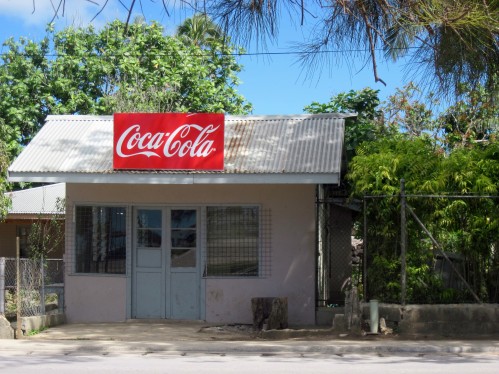
In Burma, guilt used to taste a lot like fermented lemon moonshine. Quench, the local soft drink, came in dusty, recycled bottles; often, filling in space previously labeled for Star Cola or its other carbonated siblings.
Produced by MGS Beverages, a company purportedly run by regime cronies of President (and former General) Thein Sein, every freshly-opened fizz and crackle was the sound of kyats falling into an already-wealthy wallet.
But it sure softened your thirst during the Irrawaddy Delta’s 100-degree-summer days. And, at half the price of import sodas, seemed like a backpacker’s bargain.
Ignoring the faded English letters and rust marks around the rim, we’d swab at the glass mouths, drop in a straw and guzzle down.
Now, as recently-lifted U.S. sanctions open up the Burmese market for foreign investments – including the shiny scroll of Coca-Cola’s famous signature – guilt might start to taste a bit more like cinnamon and American culture.
According to a BBC article from September 11, Burma was one of the last no-Cola outposts in the world. (Cuba and North Korea are still holding out).
While the article – and my own taste buds – confirmed that the illegal drink could indeed be found at various tourists spots, production inside the country will re-start after sixty years’ absence.
As travelers striving to make conscientious choices about our purchasing power in local communities, how does this influence our drinking habits abroad?
Coca-Cola’s CEO, Muhtar Kent, was quoted in a September 11 story from BeverageDaily.com, announcing company plans to invest $3 million in grant money to a non-governmental Burmese organization that creates economic opportunities for women. ]
And, in a country where a majority of civilians survive solely on subsistence farming, the number of jobs made available through Coca-Cola’s entry into the Burmese pop market will hopefully be a blessing in employment.
Yet foreign investment and impact often chip away at national identity. This is one of the reasons Venezuela’s president, Hugo Chavez, made a public declaration in July, asking people to enjoy the nation’s own Uvita fruit juice before drinking fizzy imports.
It’s also the reason Scottish consumers become vocally annoyed at news of Coca-Cola out-selling their own national brand, Irn Bru. For decades, this secret-recipe-of-a-soda (tasting strongly of melted gummy bears) has contested the American company for control of the country’s market. It is a source of pride that the spirited wee nation prefers Irn Bru to anything from across the pond.
Perhaps one of the best (unintentional) commentaries on the unexpected effects of globalization, via Coca-Cola, is the 1980 South African film, The Gods Must Be Crazy. In this controversial movie, an empty Coke bottle is tossed from an airplane and mistaken as a gift from the gods of a Botswana tribe.
Though initially hailed as the perfect present, the glass container quickly changes the tribe in unforeseen ways.
Does this imply that Coca-Cola’s re-introduction to Burma will be a curse in the guise of scarlet-colored aluminum cans? Or simply that we, with active passports, must make an effort to understand the choices we face on any trip- down to the simplest, “What would you like to drink today?”

Kelli Mutchler left a small, Midwest American town to prove that Yanks can, and do, chose alternative lifestyles. On the road for five years now, Kelli has tried news reporting and waitressing, bungy jumping and English teaching. Currently working with Burmese women refugees in Thailand, she hopes to pursue a MA in Global Development. Opportunities and scenes for international travel are encouraged on her blog, www.toomutchforwords.com.









